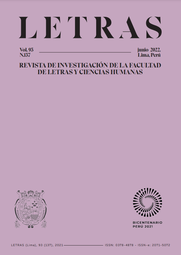“A runaway horse”: the animal becoming in “Los cuerpos del verano” by Martín Felipe Castagnet
Abstract
The novel Los cuerpos del verano (2012), by Martín Felipe Castagnet, takes up the traditional body-soul dualism and constructs a society in which the internet reconfigures, based on a mercantilist logic, the notions of life and death. It is a capitalist context in which people can separate consciousness from bodies through technology and migrate to others according to their economic capacity to acquire them. After occupying two dysfunctional human bodies, Rama, the protagonist, migrates into the body of a horse, whose form and identity he eventually embraces. This bodily journey involves a process of material and affective learning at the same time. This article analyzes the biopolitical dimension of the novel based on the residual materiality of human bodies and marginalized spaces and discusses the animal becoming that admits the figure of the horse as a fetish of corporal domestication or resistance to the dictate of hyper-technified utility.Downloads
Métricas alternativas
References
Braidotti, R. (2013). The posthuman. Polity Press.
Castagnet, F. (2016 [2012]). Los cuerpos del verano. Factotum.
Colanzi, L. (2017). Of animals, monsters, and cyborgs. Alternative bodies in Latin American fiction (1961-2012) (Tesis para optar el grado de Doctor en Literatura Comparada). Faculty of Graduate School, Universidad de Cornell.
Deleuze, G y Guattari, F. (1980). Mil plateaux. Capitalisme et schizophrénie. Les Editions de Minuit.
Eggers, C. (1971). Introducción a la lectura del Fedón. En Platón, El “Fedón” de Platón (pp. 53-71). Editorial Universitaria de Buenos Aires.
Giorgi, G. (2014). Formas comunes: animalidad, cultura y biopolítica. Eterna Cadencia.
Hayles, K. (2008 [1999]). How We Became Posthuman: Virtual Bodies in Cybernetics, Literature, and Informatics. University of Chicago Press.
Le Breton, D. (1995). Antropología del cuerpo y modernidad. Nueva Visión.
Morton, T. (2014). Deconstruction and / as Ecology. En G. Garrard (Ed.), The Oxford Handbook of Ecocriticism. Oxford University Press. https://doi.org/10.1093/oxfordhb/9780199742929.013.005
Copyright (c) 2022 Letras (Lima)

This work is licensed under a Creative Commons Attribution 4.0 International License.
Este obra está bajo una licencia de Creative Commons Reconocimiento 4.0 Internacional



















